#american federation of television and radio artists
Explore tagged Tumblr posts
Text
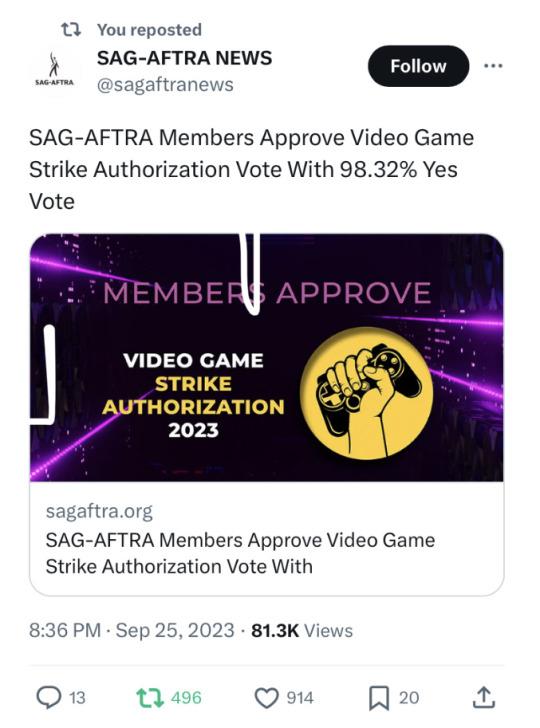
LET’S MOTHERFUCKING GOOOOOOOOO!
#SAG#AFTRA#SAG AFTRA#SAG-AFTRA#Screen Actors Guild#American Federation of Television and Radio Artists#Video Games#Videogames#Videogame Union#Videogame Unions#Union#Unions#Unionize#Labor Union#Labor Unions#Labor Strike#Labor Strikes#Actor Strike#Actor Strikes#SAG AFTRA Strike#SAG-AFTRA Strike
105 notes
·
View notes
Text
The SAG/AFTRA Strike Continues on at Warner Brothers Studios
It has been a bit, but I finally made the time to walk the picket line in support of the SAG/AFTRA strike. The WGA strike concluded after 148 days after a tentative agreement with the AMPTP was reached, but many of their members still took the time to join the picket line in continued support of the union’s efforts to gain a fair contract. While I have traveled to different strike locations in…
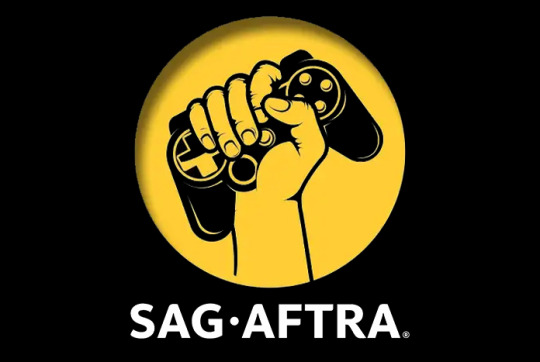
View On WordPress
#American Federation of Television and Radio Artists#Burbank#Hollywood#Los Angeles#Madonna Cacciatore#Mandalorian#Picket#Picket Line#Protest#Ralph Garman#Robin McWilliams#SAG AFTRA#SAG AFTRA Strike#SAG AFTRA Strong#Screen Actors Guild#Strike Dog#Video Games#Video Games Strike#Warner Brothers#Warner Brothers Studios#WGA#Writers Guild of America
17 notes
·
View notes
Text
Hollywood actors are going on strike after contract negotiations fail
The entertainment industry is already at a standstill because of a writers strike.
July 13, 2023, 4:12 AM EDT / Updated July 13, 2023, 3:16 PM EDT
By Daniel Arkin
NBC.com
LOS ANGELES — Thousands of Hollywood actors are heading to the picket lines after their labor union and a trade group representing the industry's leading studios failed to reach a deal on a new contract, grinding film and television production to a halt.
The national board of the Screen Actors Guild-American Federation of Television and Radio Artists, or SAG-AFTRA, voted unanimously Thursday morning to go on strike, the guild announced at an afternoon news conference.
The picket lines will start to form on Friday.
"What happens here is important because what's happening to us is happening across all fields of labor, by means of when employers make Wall Street and greed their priority and they forget about the essential contributors that make the machine run," SAG-AFTRA president Fran Drescher said.
The guild’s members, rattled by the economics of the streaming era and the rise of unregulated digital technologies, seek higher base compensation and safeguards around the use of artificial intelligence, among other demands. Hollywood's writers are already striking over similar issues.
In a news release early Thursday, SAG-AFTRA said that, after more than four weeks of bargaining, the trade association that represents major companies such as Disney, Netflix and Warner Bros. Discovery “remains unwilling to offer a fair deal on the key issues that are essential" to its members.
Drescher, who starred on the sitcom “The Nanny,” said in that statement her guild “negotiated in good faith,” but “the AMPTP’s responses to the union’s most important proposals have been insulting and disrespectful of our massive contributions to this industry.”
The Alliance of Motion Picture and Television Producers, the group representing the studios, said the strike was "certainly not the outcome we hoped for as studios cannot operate without the performers that bring our TV shows and films to life."
"The AMPTP presented a deal that offered historic pay and residual increases, substantially higher caps on pension and health contributions, audition protections, shortened series option periods, and a groundbreaking AI proposal that protects actors’ digital likenesses for SAG-AFTRA members," the group said.
"The Union has regrettably chosen a path that will lead to financial hardship for countless thousands of people who depend on the industry," the group added.
The strike will be limited to film and television productions. The walkout will not involve SAG-AFTRA members who work in the news business, such as certain broadcast hosts and announcers.
The announcement comes more than two months after the Writers Guild of America, a union that represents film and television scribes, started striking amid its own dispute with the AMPTP. (The group represents Comcast, the corporation that owns NBCUniversal; some employees of the NBCUniversal News Group are represented by the WGA.)
The writers walkout halted most television production, delayed the filming of some high-profile movies and sent late-night talk shows into reruns. The actors strike will likely force other sets to go dark.
SAG-AFTRA members authorized a strike June 5 by an overwhelming margin: 97.91% of the almost 65,000 members who cast votes. The guild began negotiating with the top studios and streaming services two days later.
The union’s existing contract with the major studios originally expired at 11:59 p.m. PT June 30, but both sides agreed to continue negotiations and extended the talks until midnight on July 12.
SAG-AFTRA has argued that performers have been undermined by the new economics of streaming entertainment and threatened by emerging technologies.
The guild is seeking increased base compensation for performers, which union leaders say has declined as streaming-first studios pivot away from paying out residuals to talent and inflation takes its toll on the economy in general.
The union’s actors are also alarmed by the threat posed by the unrelated use of AI (such as tools that can make digital replacements for recognizable stars) and the cost of “self-taped auditions” — videos that used to be paid for by casting departments and production offices.
In recent weeks, some in the entertainment business worried that all three major Hollywood guilds — SAG-AFTRA, WGA and the Directors Guild of America, or DGA — would walk off the job simultaneously.
But that will not be the case since the Directors Guild announced in early June it had reached a “truly historic” tentative agreement with the studios.
Daniel Arkin is a national reporter at NBC News.
#sag-aftra strike#what sag-aftra wants#actor's strike#screen actor's guild#american federation of television and radio artists#sag aftra
3 notes
·
View notes
Text
There’s Power in a Union
The United Auto Workers has begun a series of targeted strikes which may expand to most or all of its 145,000 members walking off the job. The Writers Guild of America has been on strike since May, disrupting pretty much any show with a script. The strike has disrupted everything from the Emmys® to The Drew Barrymore Show. Even if the shows had scripts, who would learn the lines? The Screen…

View On WordPress
#Actors&039; Equity Association#American Federation of Television and Radio Artists#IATSE#International Alliance of Theatrical Stage Employees#Screen Actors Guild#straz center#strike#unions#United Auto Workers#Writers Guild of America
0 notes
Text
Standing in Solidarity With the WGA and SAG-AFTRA
On May 2nd, 2023, the Writer’s Guild of America (WGA) union went on strike to protest poor pay and living conditions that they, as TV and Film writers, are suffering from. Last week, the Screen Actors Guild — American Federation of Television and Radio Artists (SAG-AFTRA) joined them with grievances of their own. It is crucial to stand with these union members as they fight for the compensation…
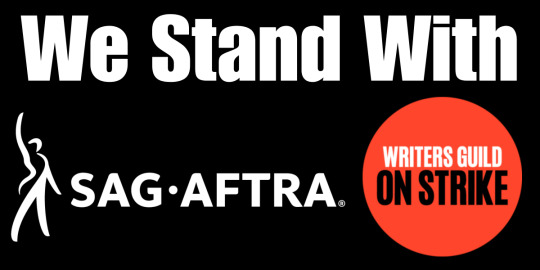
View On WordPress
#american federation of television and radio artists#by Jocelyn#sag#sag-aftra#screen actors guild#solidarity#union#wga#worker solidarity#writer&039;s guild of america
1 note
·
View note
Text
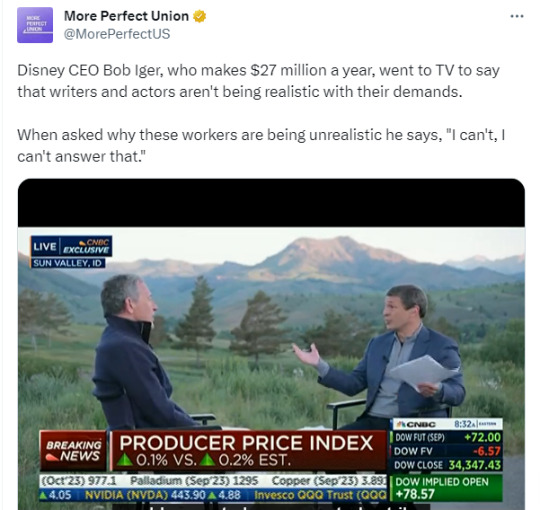
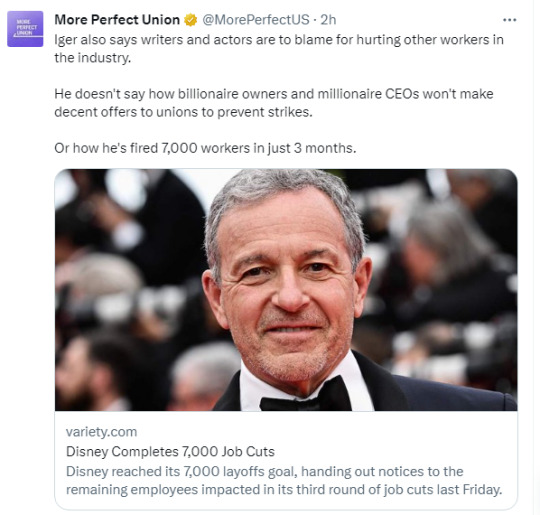
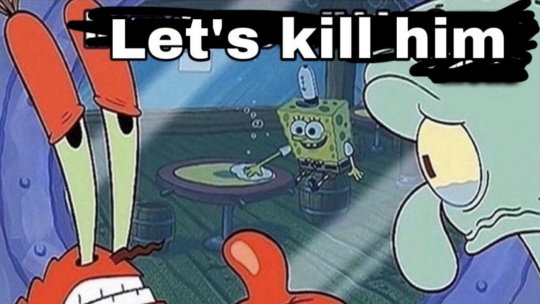
Bob Iger saying all this while also being on basically billionaires vacation really should say something, holy shit.
#writers guild of america#screen actors guild american federation of television and radio artists#wga#sag aftra#wga strike#sag aftra strike#i stand with the wga#i stand with the sag aftra#disney wouldn't even be alive nowadays if it won't for the creatives behind it#and yet bob wants to keep refusing to pay them what they deserve#while also giving himself a nice bonus with his contract being extended#same energy as in the UK the MPs wanting double their pay while everyone else suffers
4K notes
·
View notes
Text
SAG-AFTRA ‘s statement via Twitter (x) just an hour ago
“SAG-AFTRA will meet for bargaining on Monday, October 2. Several executives from AMPTP member companies will be on attendance. As negotiations proceed, we will report any substantial updates directly to you.”
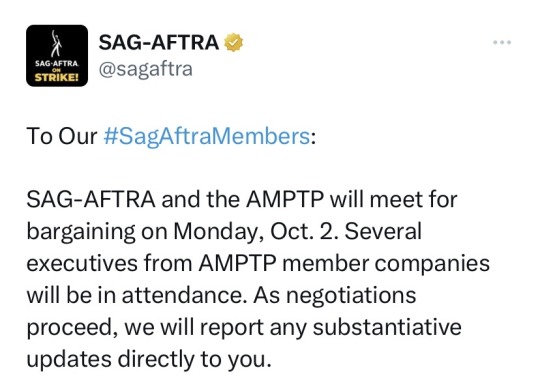
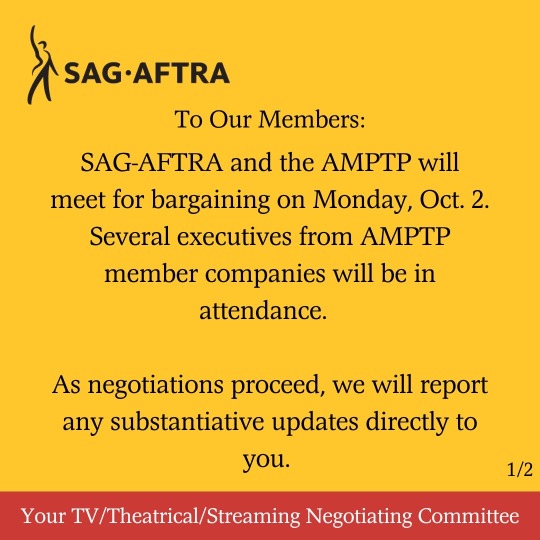

#sag aftra#Sag-aftra#screen actors guild#screen actors guild American federation of television and radio artists#Screen Actors Guild-American Federation of Television and Radio Artists#sag strike#screen actors strike#union strong#wga solidarity#wga strike is over though but standing in solidarity with sag-aftra#wga strike#pro unions
724 notes
·
View notes
Text
They fucking changed it today to try and stop uBlock from working, the motherfuckers. Stop crossing the goddamn picket line with Netflix and then maybe we wouldn't be so fucking done with you @changes @staff
#tumblr#one piece#netflix#ads#writers guild of america#wga#writers guild#writers guild of america strike#writers guild strike#wga strike#screen actors guild#screen actors guild - american federation of television and radio artists#sag#sag-aftra#screen actors guild strike#sag strike#sag-aftra strike#writers strike#actors strike#unions
18 notes
·
View notes
Text
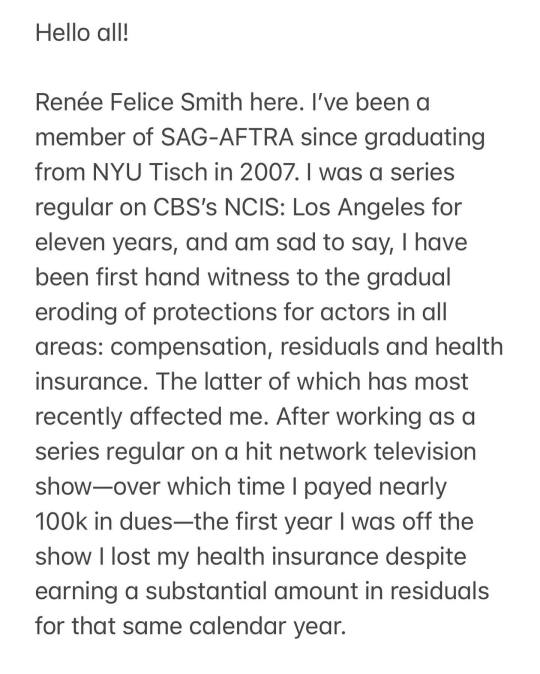



📣📣📣📣📣📣📣📣📣 calling all @sagaftra members! THE TIME IS NOW! I implore you to write a letter in support of a strike authorization vote ASAP! Let’s not forget, they represent US. So, make your voice heard. Share this post! E-mail your letter to: [email protected] [email protected] ATTN: ALL National Board Members and Officers: The working people of our industry greatly outnumber the studio executives. If we stand together against their corporate greed, we will win. 👊👊👊
#signal boost#ncis la#ncisla cast#cast#renee felice smith#writers strike#sag aftra#labour rights#unionization#screen actors guild#screen actors guild - american federation of television and radio artists
13 notes
·
View notes
Text
Okay I wanna clarify something real quick..
SAG-AFTRA is the Screen Actors Guild and the American Federation of Television and Radio Artists. So actors (and more) union.
WGA is the Writers Guild of America. So writers union.
They went on strike last year. They went on strike because of a lot of things but things like AI and residuals were big topics.
IATSE is International Alliance of Theatrical Stage Employees. So the crew is under this.
They almost went on strike a few years ago but made a deal before it reached that point. (The union members vote on a contract that it was just over a 50/50 on the for and against. But ultimately it ended up being a a touch more on the for side).
Their contract is up for renewal right now and they are actively negotiating. If those talks don't end in a deal at the end of July, they will most likely strike.
4K notes
·
View notes
Text
"The studios thought they could handle a strike. They might end up sparking a revolution"
by Mary McNamara
"If you want to start a revolution, tell your workers you’d rather see them lose their homes than offer them fair wages. Then lecture them about how their “unrealistic” demands are “disruptive” to the industry, not to mention disturbing your revels at Versailles, er, Sun Valley.
Honestly, watching the studios turn one strike into two makes you wonder whether any of their executives have ever seen a movie or watched a television show. Scenes of rich overlords sipping Champagne and acting irritated while the crowd howls for bread rarely end well for the Champagne sippers.
This spring, it sometimes seemed like the Hollywood studios represented by the Alliance of Motion Picture and Television Producers were actively itching for a writers’ strike. Speculations about why, exactly, ran the gamut: Perhaps it would save a little money in the short run and show the Writers Guild of America (perceived as cocky after its recent ability to force agents out of the packaging business) who’s boss.
More obviously, it might secure the least costly compromise on issues like residuals payments and transparency about viewership.
But the 20,000 members of the WGA are not the only people who, having had their lives and livelihoods upended by the streaming model, want fair pay and assurances about the use of artificial intelligence, among other sticking points. The 160,000 members of the Screen Actors Guild-American Federation of Television and Radio Artists share many of the writers’ concerns. And recent unforced errors by studio executives, named and anonymous, have suddenly transformed a fight the studios were spoiling for into a public relations war they cannot win.
Even as SAG-AFTRA representatives were seeing a majority of their demands rejected despite a nearly unanimous strike vote, a Deadline story quoted unnamed executives detailing a strategy to bleed striking writers until they come crawling back.
Days later, when an actors’ strike seemed imminent, Disney Chief Executive Bob Iger took time away from the Sun Valley Conference in Idaho not to offer compromise but to lecture. He told CNBC’s David Faber that the unions’ refusal to help out the studios by taking a lesser deal is “very disturbing to me.”
“There’s a level of expectation that they have that is just not realistic,” Iger said. “And they are adding to the set of the challenges that this business is already facing that is, quite frankly, very disruptive.”
If Iger thought his attempt to exec-splain the situation would make actors think twice about walking out, he was very much mistaken. Instead, he handed SAG-AFTRA President Fran Drescher the perfect opportunity for the kind of speech usually shouted atop the barricades.
“We are the victims here,” she said Thursday, marking the start of the actors’ strike. “We are being victimized by a very greedy entity. I am shocked by the way the people that we have been in business with are treating us. I cannot believe it, quite frankly: How far apart we are on so many things. How they plead poverty, that they’re losing money left and right, when giving hundreds of millions of dollars to their CEOs. It is disgusting. Shame on them. They stand on the wrong side of history at this very moment.”
Cue the cascading strings of “Les Mis,” bolstered by images of the most famous people on the planet walking out in solidarity: the cast of “Oppenheimer” leaving the film’s London premiere; the writers and cast of “The X-Files” reuniting on the picket line.
A few days later, Barry Diller, chairman and senior executive of IAC and Expedia Group and a former Hollywood studio chief, suggested that studio executives and top-earning actors take a 25% pay cut to bring a quick end to the strikes and help prevent “the collapse of the entire industry.”
When Diller is telling executives to take a pay cut to avoid destroying their industry, it is no longer a strike, or even two strikes. It is a last-ditch attempt to prevent le déluge.
Yes, during the 2007-08 writers’ strike, picketers yelled noncomplimentary things at executives as they entered their respective lots. (“What you earnin’, Chernin?” was popular at Fox, where Peter Chernin was chairman and chief executive.) But that was before social media made everything more immediate, incendiary and personal. (Even if they have never seen a movie or TV show, one would think that people heading up media companies would understand how media actually work.)
Even at the most heated moments of the last writers’ strike, executives like Chernin and Iger were seen as people who could be reasoned with — in part because most of the executives were running studios, not conglomerations, but mostly because the pay gap between executives and workers, in Hollywood and across the country, had not yet widened to the reprehensible chasm it has since.
Now, the massive eight- and nine-figure salaries of studio heads alongside photos of pitiably small residual checks are paraded across legacy and social media like historical illustrations of monarchs growing fat as their people starve. Proof that, no matter how loudly the studios claim otherwise, there is plenty of money to go around.
Topping that list is Warner Bros. Discovery Chief Executive Davd Zaslav. Having re-named HBO Max just Max and made cuts to the beloved Turner Classic Movies, among other unpopular moves, Zaslav has become a symbol of the cold-hearted, highly compensated executive that the writers and actors are railing against.
The ferocious criticism of individual executives’ salaries has placed Hollywood’s labor conflict at the center of the conversation about growing wealth disparities in the U.S., which stokes, if not causes, much of this country’s political divisions. It also strengthens the solidarity among the WGA and SAG-AFTRA and with other groups, from hotel workers to UPS employees, in the midst of disputes during what’s been called a “hot labor summer.”
Unfortunately, the heightened antagonism between studio executives and union members also appears to leave little room for the kind of one-on-one negotiation that helped end the 2007-08 writers’ strike. Iger’s provocative statement, and the backlash it provoked, would seem to eliminate him as a potential elder statesman who could work with both sides to help broker a deal.
Absent Diller and his “cut your damn salaries” plan, there are few Hollywood figures with the kind of experience, reputation and relationships to fill the vacuum.
At this point, the only real solution has been offered by actor Mark Ruffalo, who recently suggested that workers seize the means of production by getting back into the indie business, which is difficult to imagine and not much help for those working in television.
It’s the AMPTP that needs to heed Iger’s admonishment. At a time when the entertainment industry is going through so much disruption, two strikes is the last thing anyone needs, especially when the solution is so simple. If the studios don’t want a full-blown revolution on their hands, they’d be smart to give members of the WGA and SAG-AFTRA contracts they can live with."
#sag-aftra strike#sag strike#fans4wga#writers guild strike#actors guild strike#union solidarity#wga strong#i stand with the wga#wga strike#writers strike
7K notes
·
View notes
Quote
On August 11, day 102 of the 11,500-person Writers Guild of America (WGA) strike, which has largely shut down the film industry coast to coast, aided by below-the-line workers respecting picket lines and bolstered by 160,000 members of the Screen Actors Guild-American Federation of Television and Radio Artists (SAG-AFTRA), who initiated their own strike on July 14, the studios finally returned to the bargaining table. The Alliance of Motion Picture and Television Producers (AMPTP), the organization that bargains on behalf of the major studios, offered counterproposals, a long-awaited response to the WGA’s proposals. The two sides met the following week and continued to exchange proposals. Then, on August 22, day 113 of the WGA strike, the two sides met again, but with an important addition: previous negotiating sessions had been led by AMPTP president Carol Lombardini, the studios’ hired hand, while at this one, the bosses who make the decisions were in the room. Disney CEO Bob Iger, Warner Bros. Discovery CEO David Zaslav, Netflix co-CEO Ted Sarandos, and NBCUniversal’s Donna Langley came to the table to face the WGA’s elected leadership in the room outside of the AMPTP’s Sherman Oaks, California, headquarters where the negotiations have taken place. Workers, suffering the devastating effects of a months-long strike, hoped that the studios might finally offer counterproposals that meet their needs. Instead, the bargaining session led to further unraveling. “We accepted [the] invitation and, in good faith, met tonight, in hopes that the companies were serious about getting the industry back to work,” wrote the WGA negotiating committee in a message to members following the meeting. “Instead, on the 113th day of the strike — and while SAG-AFTRA is walking the picket lines by our side — we were met with a lecture about how good their single and only counteroffer was.” The two sides had agreed to adhere to a media blackout, vowing not to leak information about the proposals to third parties. Yet immediately following the August 22 session, the AMPTP publicly released a document highlighting elements of their counterproposal. “This was a meeting to get us to cave,” said the WGA leadership, “which is why, not twenty minutes after we left the meeting, the AMPTP released its summary of their proposals.”
The Hollywood Studios Still Aren’t Serious About Ending the Writers’ Strike
These sociopath CEOs are hearing it from shareholders, who want us to get back to work. The shareholders are making it clear that the psychopath CEOs can release the LESS THAN ONE PERCENT of their compensations to get us back to work.
So the sociopath CEOs put on a big show of coming back to bargain and work this out ... and when the WGA sits down to bargain, these sociopath CEOs have the fucking nerve to just lecture the WGA about how great their absolute garbage offer is. The offer WGA rejected because it didn’t address any of the issues on the table.
These sociopath CEOs are the problem:
Disney CEO Bob Iger, Warner Bros. Discovery CEO David Zaslav, Netflix co-CEO Ted Sarandos, and NBCUniversal’s Donna Langley
These sociopath CEOs are greedy and entitled. That any one of them thought that lecturing WGA, then gaslighting members (in violation of not just the agreed upon media blackout, but likely in violation of labor law) would move us any closer to getting back to work tells you everything you need to know about who the problem is.
Fuck these scumbags, fuck their greed, and fuck their gaslighting.
2K notes
·
View notes
Text
Walking the WGA and SAG/AFTRA Picket Line at Paramount Studios
On July 20, 2023, I did something I had been meaning to do for a long time: walk the picket line alongside members of the Writer’s Guild of America (WGA) and the Screen Actors Guild – American Federation of Television and Radio Artists (SAG/AFTRA). Both unions are in a furious labor dispute with the Alliance of Motion Picture and Television Producers (AMPTP) as streaming has forever changed the…

View On WordPress
#Actors Strike#AFTRA#American Federation of Television and Radio Artists#Entertainment Community Fund#Hollywood#Los Angeles#Melrose Avenue#Motion Picture and Television Fund#MPTF#Paramount Studios#Picket#Picket Line#Protest#SAG#Screen Actors Guild#Strike#Video#WGA#WGA Contract 2023#WGA on Strike#Writers Guild of America#Writers Strike
2 notes
·
View notes
Text
Why Actors Are Going on Strike
BY LAURA ZORNOSA
Time.com
UPDATED: JULY 12, 2023 4:37 PM EDT | ORIGINALLY PUBLISHED: JULY 12, 2023 4:28 PM EDT
Just after midnight on the West Coast, the contracts between the Screen Actors Guild-American Federation of Television and Radio Artists (SAG-AFTRA) and the Alliance of Motion Picture and Television Producers (AMPTP) expired—meaning that a deal between the two had not been reached. SAG-AFTRA’s negotiating committee unanimously voted to recommend a strike to its national board, which is expected to formally announce the strike on Thursday.
On June 5, nearly 65,000 of the approximately 160,000 members that make up SAG-AFTRA approved a strike authorization with a 97.91% “yes” vote. The union includes actors, dancers, DJs, puppeteers, recording artists, singers, stunt performers, voiceover artists, and other media professionals.
Two days later, SAG-AFTRA entered negotiations on its agreement with the AMPTP, including Amazon/MGM, Apple, NBCUniversal, Disney/ABC/Fox, Netflix, Paramount/CBS, Sony, and Warner Brothers. On June 30, the contracts between the two were extended, and they now expire at midnight on Wednesday.
“There has been a sea change in the entertainment industry, from the proliferation of streaming platforms to the recent explosion of generative AI, and at stake is the ability of our members to make a living,” Duncan Crabtree-Ireland, the SAG-AFTRA National Executive Director and Chief Negotiator, said in a letter about the strike authorization referendum. “We must ensure that new developments in the entertainment industry are not used to devalue or disrespect the performers who bring productions to life.”
On Tuesday, SAG-AFTRA agreed to AMPTP’s last-minute request for federal mediation, which would bring in a neutral third party to help work toward a compromise. SAG-AFTRA clarified, though, that it would not extend the negotiations for a second time.
“We will not be distracted from negotiating in good faith to secure a fair and just deal by the expiration of our agreement,” the guild said in a press release. “We are committed to the negotiating process and will explore and exhaust every possible opportunity to make a deal, however we are not confident that the employers have any intention of bargaining toward an agreement.”
Among SAG-AFTRA’s demands are increased minimum pay rates, increased streaming residuals (neither of which have kept up with inflation), and improved working conditions. Royalty payments, which are contingent on the number of a show’s reruns, are no longer reliable. Streaming, which has shifted to shorter seasons over longer periods of time, has made less work available to actors. And union members want guarantees from studio and production companies about how, exactly, artificial intelligence will be used—they want to protect their likenesses and make sure they are well compensated when any of their work is used to train AI.
On June 27, more than 300 actors—including Meryl Streep, Quinta Brunson, and Jennifer Lawrence—signed a letter to the SAG-AFTRA Leadership and Negotiating Committee stating that “SAG-AFTRA members may be ready to make sacrifices that leadership is not.”
“We hope you’ve heard the message from us: This is an unprecedented inflection point in our industry, and what might be considered a good deal in any other years is simply not enough,” the letter reads. “We feel that our wages, our craft, our creative freedom, and the power of our union have all been undermined in the last decade. We need to reverse those trajectories.”
When was the last time SAG-AFTRA went on strike?
SAG-AFTRA has a long history of strikes and boycotts. In 2021, the union barred Donald Trump from ever rejoining because he obstructed the peaceful transfer of power to Joe Biden—and because of his attacks on journalists. (Trump had resigned from the group earlier that month.)
In 2018, SAG-AFTRA announced a strike against the global advertising agency Bartle Bogle Hegarty after the advertising agency stated that it would no longer honor its long-standing contract with the union. Ten months later, the advertising agency agreed to sign SAG-AFTRA’s new commercials contract.
SAG and AFTRA, which merged in 2012, went on strike together for the first time in 2016, against eleven American video game developers and publishers, which became the longest strike within SAG.
In 2000, before they merged, SAG and AFTRA issued a controversial six-month work stoppage over the protocol for paying actors who appear in TV commercials. Twenty years prior, SAG and AFTRA jointly called for a successful boycott against 1980s’ Emmy Awards, striking for an increase in minimum salaries.
How the ongoing writers’ strike factors in
In 1960, SAG went on strike against AMPTP over pay, joining the Writers Guild of America (WGA), which had already been on strike for more than a month with similar demands, largely over pay rates. That marked the first industry-wide strike in Hollywood.
In a historical echo, today, the WGA has been on strike since early May. If SAG-AFTRA’s demands are not met this time around, it will join the WGA on strike, bringing Hollywood to a near standstill. In preparation, SAG-AFTRA has called for volunteers to serve as strike captains, and WGA captains—already on strike at several studios—have offered training from the picket lines.
What this means for movies and TV shows
If SAG-AFTRA members do go on strike, any film or TV production that has not already been halted by the WGA strike will essentially shut down. Overseas productions, in particular, where studios have tried to continue shooting some shows without WGA writer-producers, are likely to feel the impact.
#actor's strike#sag-aftra strike#studio actor's guild#american federation of television and radio artists#sag aftra#sag-aftra
2 notes
·
View notes
Text
Following prolonged negotiations with many of the biggest companies in video games, the Screen Actors Guild-American Federation of Television and Radio Artists (SAG-AFTRA) has called for a video game performer and voice actor strike, beginning on July 26. Try as they might, the two sides have been unable to see eye to eye on the issue of AI. “The video game industry generates billions of dollars in profit annually," said SAG-AFTRA national executive director and chief negotiator Duncan Crabtree-Ireland in a statement to Aftermath. "The driving force behind that success is the creative people who design and create those games. That includes the SAG-AFTRA members who bring memorable and beloved game characters to life, and they deserve and demand the same fundamental protections as performers in film, television, streaming, and music: fair compensation and the right of informed consent for the AI use of their faces, voices, and bodies. Frankly, it’s stunning that these video game studios haven’t learned anything from the lessons of last year - that our members can and will stand up and demand fair and equitable treatment with respect to AI, and the public supports us in that." Workers can now strike at ten companies: Activision, Blindlight, Disney Character Voices, EA, Epic, Formosa Interactive, Insomniac Games, Take-Two, VoiceWorks, and WB Games.
July 25, 2024
152 notes
·
View notes
Text
How the SAG-AFTRA and WGA strikes affect The Dragon Prince

As a TDP content creator, I can’t stay silent about how this affects one of my favorite TV shows and entertainment in general going forward.
TL:DR the Strike
the Writers Guild of America (WGA) and the Screen Actors Guild - American Federation of Television and Radio Artists (SAG-AFTRA) are on strike now meaning anyone in these unions or anyone looking to be apart of these unions will not work until their demands are met
both unions are demanding “more equitable division of the profits from movies and television” as well as arguing that AI will never be “literary material” and “is a threat to creative professionals everywhere”
How This Affects TDP
the strikers are not calling for people to cancel streaming subscriptions or stop watching content, if anything they want people to watch content so the execs can see they are needed
SO WATCH TDP S5 WHEN IT COMES OUT JULY 27TH
STREAM STREAM STREAM
Wonderstorm Inc, which creates TDP, is based out of the USA, so any changes due to the strike directly affect them
as far as I know, Jesse Inocalla (Soren) and Jack De Sena (Callum) are apart of the SAG with Jesse posting updates to his IG story and Devon Giehl (Lead Writer) has tweeted about the strikes
almost all of the TDP actors are Canadian, not American, Jack (Callum) and Erik (Aaravos) are the only solely US based cast
the Theatrical and TV sections of SAG are on strike, not animation or video games
the TDP team is still allowed to promote The Dragon Prince and TDP S5, it is NOT a Struck project, we wanna show our love to this show like crazy
TDP is a ACTRA project, which stands for Alliance of Canadian Cinema, Television and Radio Artists
ACTRA is not on strike, but stands in solidarity with SAG
TL:DR - TDP is not a struck project and can proceed as normal, but
We need to STAND with the strikers of the WGA and the SAG-AFTFA ! We need to support them !
This is the only way we will ever get entertainment that is representative of the human soul with workers who can afford to live.
569 notes
·
View notes